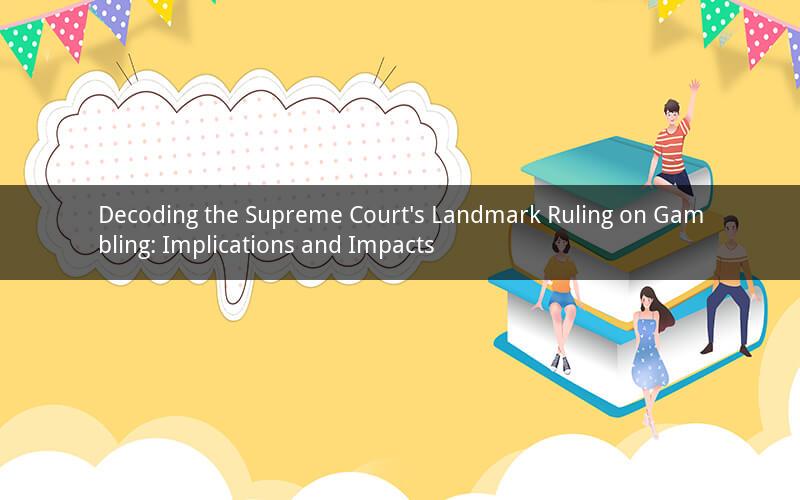
Introduction:
The Supreme Court's recent ruling on gambling has sparked widespread discussions and debates across the nation. This article delves into the implications and impacts of this landmark decision, analyzing its significance and how it may shape the future of gambling in the United States.
1. Background:
To understand the magnitude of the Supreme Court's ruling on gambling, it is crucial to consider the historical context. In 1992, the Professional and Amateur Sports Protection Act (PASPA) was enacted, which effectively banned sports betting across the country. However, in 2018, the Supreme Court overturned this law, paving the way for states to regulate and permit sports betting within their jurisdictions.
2. The Ruling:
The Supreme Court's ruling on gambling, specifically regarding sports betting, has several key takeaways:
a. Legalization: The court's decision effectively legalized sports betting, allowing states to determine their own regulations and taxing policies.
b. Economic Implications: The ruling is expected to generate billions of dollars in revenue for states, as well as create job opportunities in the sports betting industry.
c. Increased Transparency: With sports betting now legal, there is a heightened demand for transparency and integrity in the industry. This includes the implementation of anti-cheating measures and responsible gambling practices.
3. State-Level Reactions:
Following the Supreme Court's ruling, various states have started to explore the potential of sports betting. Here are some notable developments:
a. New Jersey: One of the first states to challenge PASPA, New Jersey has been at the forefront of sports betting regulation. The state has already established a framework for legal sports betting, attracting numerous operators and bettors.
b. Pennsylvania: Pennsylvania has also embraced the opportunity to regulate sports betting, with several casinos and online platforms now offering sports betting services.
c. West Virginia: West Virginia has quickly become a leader in sports betting, with a thriving market and innovative strategies to attract bettors.
4. Challenges and Concerns:
Despite the positive aspects of the Supreme Court's ruling, there are still challenges and concerns that need to be addressed:
a. Problem Gambling: The rise in sports betting has raised concerns about problem gambling, with some experts advocating for stricter regulations to protect vulnerable individuals.
b. Corruption and Fraud: There is a fear that the lack of a unified regulatory framework could lead to corruption and fraud in the sports betting industry.
c. Sports Integrity: The integrity of sports is at stake, as betting could potentially influence outcomes. This has led to calls for stricter rules and oversight to maintain fair competition.
5. The Future of Gambling:
The Supreme Court's ruling on gambling has set the stage for a new era in the industry. Here are some potential future developments:
a. Expansion: As more states embrace sports betting, the market is expected to expand significantly, with new opportunities for operators and bettors.
b. Technology Integration: The integration of advanced technology, such as blockchain and artificial intelligence, is likely to enhance the sports betting experience and improve security.
c. Global Implications: The United States' decision to legalize sports betting may influence other countries to reconsider their own gambling regulations.
6. Conclusion:
The Supreme Court's ruling on gambling has far-reaching implications, impacting both the industry and its stakeholders. As states continue to explore and regulate sports betting, it is essential to address the challenges and concerns that arise. The future of gambling in the United States will depend on how these issues are navigated and the ongoing commitment to integrity, transparency, and responsible gambling practices.
Questions and Answers:
1. Q: How has the Supreme Court's ruling on gambling impacted the sports betting industry?
A: The ruling has paved the way for the legalization of sports betting across the United States, leading to significant growth in the industry and the potential for billions of dollars in revenue.
2. Q: What are the potential economic benefits of legalizing sports betting?
A: Legalizing sports betting can generate substantial revenue for states, create job opportunities, and potentially boost tourism.
3. Q: Are there any concerns regarding the potential negative impacts of sports betting?
A: Yes, there are concerns about problem gambling, corruption and fraud, and the integrity of sports. These issues require strict regulations and oversight to mitigate their negative impacts.
4. Q: How can states ensure responsible gambling practices in the sports betting industry?
A: States can implement measures such as self-exclusion programs, age verification, and educational campaigns to promote responsible gambling.
5. Q: What is the future of gambling in the United States?
A: The future of gambling in the United States is expected to see continued expansion, technological innovation, and a greater emphasis on integrity and responsible gambling practices.